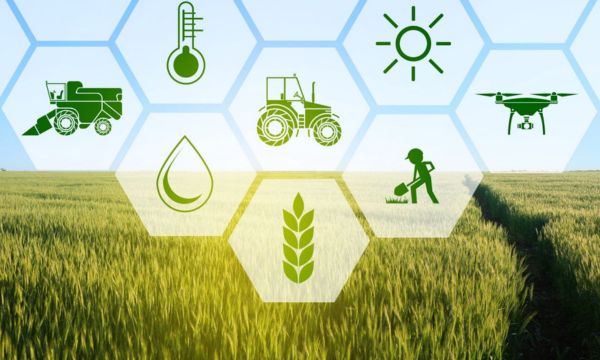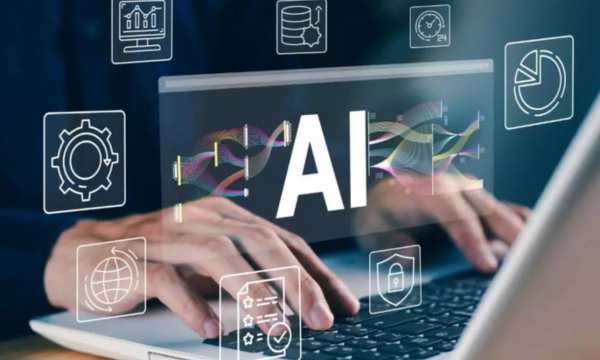Artificial intelligence (AI) technology is transforming the agricultural sector, making agriculture more efficient, sustainable, and successful in the future.
Ad
The use of artificial intelligence in agriculture can help solve some of the biggest problems facing the industry today, such as climate change, labor shortages, and the need to produce more food to feed the world’s growing population.
This comprehensive guide aims to clear up any confusion about how artificial intelligence is used in agriculture and how it could revolutionize the field.
The Role of AI in Modern Agriculture
AI in agriculture is a combination of new technologies and old farming methods. It offers creative ways to increase food production, improve agricultural operations, and reduce damage to the environment.
Artificial intelligence provides farmers with the information and tools to automate previously unfeasible tasks through data analytics, machine learning, and predictive modeling.
Important ways to apply AI in agriculture
1. Precision Agriculture One of the main ways in which artificial intelligence is being applied to agriculture is precision agriculture.
It involves using artificial intelligence algorithms to look at data from different sources, such as satellite images, weather forecasts, and soil sensors, to make informed choices about when to plant, water, and harvest.
This approach enables the best possible use of resources, increasing productivity and reducing waste.
2. Monitor crops and soil AI tools can monitor the health of crops and soils. Artificial intelligence drones and satellites can look through photos to find plant diseases, pest outbreaks, and nutrient deficiencies.
This real-time tracking allows people to protect crops and ensure they grow optimally at the right time.
3. Use predictive analytics to grow crops Artificial intelligence is used for predictive analytics to guess what will happen in agriculture based on past data and current conditions.
Farmers can guess when is the best time to plant and harvest crops when crop diseases are likely to occur, and the likelihood of drought or other severe weather.
This planning helps minimize risks and improve crop yields.
4. Machines that work independently Thanks to artificial intelligence, agricultural machines such as tractors and drones are becoming increasingly automated.
These autonomous vehicles can perform tasks such as planting, spraying, and collecting without human assistance. Farms can increase productivity and address labor shortages by automating daily tasks.
5. Care for livestock AI helps farmers monitor the health and habits of their livestock. Wearable technology can track an animal’s whereabouts, diet, and any signs of illness.
AI algorithms look at this data to learn more about how to improve animal welfare, increase production, and control diseases.
Benefits of Artificial Intelligence in Agriculture
- Better yields and productivity Artificial intelligence technology has significantly improved agricultural production and crop yields through improved farming methods. This helps meet the food needs of a growing population.
- Resource efficiency Precision agriculture, powered by artificial intelligence, uses resources such as water, fertilizers, and pesticides more rationally, which not only saves money but is also better for the earth.
- Better decisions AI research provides farmers with useful information they can use to make decisions that improve farm management and crop health.
- Long-term success Artificial intelligence helps make agriculture more sustainable by using fewer chemicals, conserving resources, and reducing the carbon footprint.

Understanding AI Tech in Agriculture (Source – Google)
Challenges and Future Directions
Artificial intelligence has enormous potential to transform agriculture, but there are still some problems that need to be solved. Some of these include the high cost of AI technology, the need for digital infrastructure in rural areas, and concerns about data privacy and security.
In addition, farmers need to learn how to use AI tools more successfully.
In the future, artificial intelligence in agriculture will try to solve these problems and come up with new ideas at the same time.
New trends include making AI models smarter for predictive analytics, combining AI with other technologies like blockchain to make supply chains more open, and looking at how AI can be applied to vertical farming and urban farming.
Conclusion
Using AI in agriculture is not just about improving technology; This is also to ensure that the food supply can be sustainable in the future.
By using artificial intelligence, the agricultural sector can solve some of its biggest problems, protect food security, protect the environment, and ensure the financial stability of farmers around the world.
Going forward, the continued use and improvement of AI in agriculture will be important to create a better, more resilient, and sustainable food system for future generations.
FAQs
1. What is the difference between precision agriculture with artificial intelligence and traditional agriculture?
Use artificial intelligence for precision agriculture, making farming more accurate and controllable through data analytics, machine learning, and real-time tracking.
Precision agriculture is changing the way crops are managed to meet the needs of each field and even each plant.
This ensures better use of resources and higher returns than traditional approaches that tend to use one-size-fits-all.
2. Can the use of artificial intelligence in agriculture help combat climate change?
Yes, AI in agriculture can help combat climate change by making better use of resources and reducing waste.
For example, AI-powered precision gardening can prevent farmers from using too much water and fertilizer, reducing runoff and greenhouse gas emissions. AI can also help store carbon by finding the best ways to use space and rotate crops.
3. Are there privacy concerns in the application of artificial intelligence in agriculture?
Yes, there are privacy concerns with agricultural AI, as with any technology that collects and analyzes data. These concerns mainly relate to the way corporate data is collected, stored, and used.
The data may include private information about farming practices, crop results, and land use. Ensuring that data remains private and secure is important to maintaining farmers’ trust in AI technology.
4. How easy is it for small farmers or those without significant resources to use AI technology?
Artificial intelligence holds great promise for agriculture, but remains difficult to implement, especially for small farmers or those without large resources.
Barriers include the high cost of AI tools and the lack of digital infrastructure in some rural areas. However we’re working hard to make AI options more affordable and improve digital connectivity so that all farmers can use AI in agriculture.
5. Can artificial intelligence make farms completely self-sufficient?
Many parts of agriculture, such as planting, watering, tracking, and harvesting, can be automated through AI technology. However, complete automation of farms is not yet possible.
Human oversight and decision-making remain a very important part of business management, especially when it comes to unpredictable variables and making long-term choices.
6. What skills are needed to use artificial intelligence in agriculture?
To use artificial intelligence in agriculture, in addition to general agricultural knowledge, you also need to know how to use digital tools, analyze data, and learn to program machines.
As artificial intelligence technology is increasingly used in agriculture, the agricultural sector needs more professionals with digital literacy and technical capabilities.


